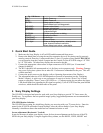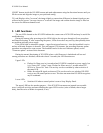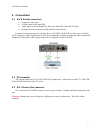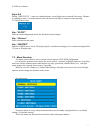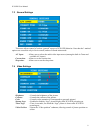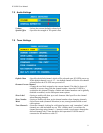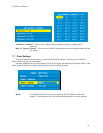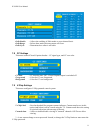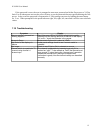
ICS-SP20 User Manual
4
VSHIFT buttons inside the ICS-SP20 menus and make adjustments using the directional arrows until you
fill the screen and align the image to your preferred setting.
TVs and Displays often "overscan" the image slightly to ensure that difference in channel signals are not
reflected on the screen. You may choose to "overscan" the image and confirm that the image is filled on
the screen for different channels used.
5 LED functions
The two LEDs located on the ICS-SP20 indicate the current state of ICS-SP20 and may be useful for
troubleshooting.
During the startup (after powering on) the LEDs blink as the unit goes through self-test procedures
and firmware booting. If, after connecting the power, LEDs do not show any activity, then probably there
are problems with the power supply.
If the LEDs blink in alternative pattern -- upper/lower/upper/lower/etc – then the bootblock is active
and no valid main firmware is detected. This can happen if, for instance, the preceding firmware update
procedure was aborted for some reason. The bootblock waits for the new firmware upload, see the
“Firmware update” section of this document.
During the normal functioning of ICS-SP20 (when a valid firmware is loaded and self-test and
startup procedures are finished, which takes about 2 seconds), the LED functions are:
Upper LED:
• Flashes for 50ms once in 6 seconds when ICS-SP20 is attached to power supply, but
is in “Power Off” (“sleep”) state. Flashes for 50ms once in 3 seconds when ICS-
SP20 is in “Power On” state. This activity can be overridden by other activities of
the same LED.
• Blinks fast when IR signal are detected. This can be used to see whether ICS-SP20
receives any IR control packets or not. This does not mean that ICS-SP20 recognizes
any IR command.
Lower LED:
• Switches ON when a control packet is sent to Sony Display Panel.
The upper LED has also another purpose – if the ICS-SP20 encounters an internal irrecoverable
error, it stops all activities and starts blinking the upper LED in series (series of blinks, then a longer
delay, then the series of blinks is repeated, so on).






